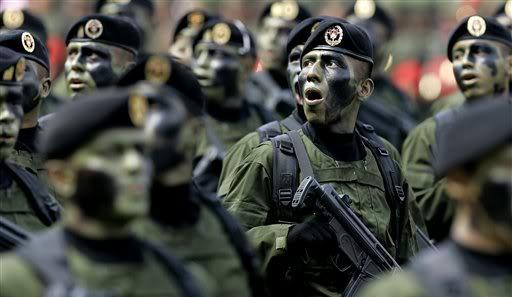Brussels, Belgium – 1 March 2012
by Jonathan Dowdall
Mexican President Felipe Calderon’s six year campaign of high-profile killings against top cartel leaders has failed to produce stability and is directly responsible for the continued rise in the country’s civil war-like death toll.
Vanda Felbab-Brown, narcotics conflict specialist at Washington-based Brookings Institute, told DefenceReport that the Mexican government’s military crackdown on cartels is destroying the country’s civil security. “The strategy of breaking up the cartels violently, by arresting and killing top leadership, has generated tremendous residual levels of cartel violence”, she said. “This violence is, to a great degree, out of control.”
Experts also add that, in this – an election year – competing cartels geographically displaced by the government security crackdown will escalate their intimidation tactics against politicians.
Cartel violence on the rise
This damning assessment comes in the wake of the latest Mexican government statistics, which indicate that drug-related cartel murders in 2011 rose by 11 percent on the previous year, to around 12 thousand.
This death-toll, when added to a growth in violence of some 71 percent between 2009-2010, confirms that total drug-related casualties since 2006 in Mexico may be as high as 50 thousand – higher then some estimates of civilian deaths in Afghanistan since 2001. Mexican officials have been quick to search for any positive trends in the latest figures. Attorney General Marisela Morales Ibanez stressed in a 17 January statement that “it’s the first year (since 2006) that the homicide rate increase has been lower compared to previous years.” Similarly, President Calderon has focused on decreasing violence in some urban centres.
Speaking from the city of Juarez, where over three thousand people died in 2010, Calderon highlighted a death rate decline of 45 percent since 2011 in that region. The Government also cites evidence that the majority of Mexcio’s violent incidents are “narco-on-narco” – or inter-cartel – by nature. The Office of the Minister of Interior was unavailable for comment on these claims for DefenceReport.
But Felbab-Brown, who is the author of Shooting Up: Counterinsurgency and the War on Drugs, says such statistics are the “side effects” of the government’s heavily militarised anti-cartel strategy. The security forces’ campaign of high-profile cartel killings has been executed with little understanding of how weakening one cartel may benefit or spur increased activity by another. “Rather than thinking, ‘if we hit an organisation in this manner, what kind of violence will that trigger?’, they are randomly hitting the key narcos based on any intelligence that comes up,” she explained. This has ignited large-scale violence between cartels who are now competing over the control of vital drug trade routes.
Geographic shift in cartel power
One major side-effect has been the radical shift in location of cartel violence in the past year. According to geo-political analysis group Stratfor, government pressure on Mexico’s cartels is not uniform. It not only varies from one cartel to the next – but from one geographic region to the next. Some cartels – like the Sinaloa Federation operating in Mexico’s north-western corridor and the Los Zetas cartel on the East coast – have expanded their reach in 2011 at the expense of cartels damaged by Government forces.
This process of assimilating weakened cartels and shifting control into new areas is a key dynamic in the increase of Mexican violence. One Latin American security analyst spoke to DefenceReport, but asked to remain anonymous due to the sensitive nature of his team’s research into cartel activity in countries linked to the Mexican drugs trade. “We are witnessing a transfer of violence from the north to other urban centres in Mexico, with potentially radical consequences.” He said the sharp increase of killings in previously peaceful States like Nuveo Leone, the Mexican industrial heartland, indicates that the Government’s “oil spot” approach is failing to secure the country. “What we have now is a combination of a stabilisation of violence in certain districts and a significant increase in other areas previously untouched by violence”, the source explained. “This strategy does not work in terms of weakening cartel control at the general national level.”
Political risk in 2012
This assessment comes at a dangerous time for Mexico, which will be holding country-wide elections on 1 July. While Calderon’s career will be judged in retrospect as he leaves office at the end of his fixed single term, at greater risk are some 600 Senatorial and Chamber of Deputy positions that will also be put to the ballot this year.
“My impression is that, during this year – an electoral year – we will see demonstrations of force (by cartels) in order to intimidate local candidates,” the expert explained. “Violence is there for intimidation, and because they need to compete with rival cartels for access to state institutions and figures, that means the violence must also be political”, he said.
Electoral politics are also likely to hamstring Mexican decision makers for the foreseeable future. “This year will not be a year for big decisions – elections tend to paralyse big political changes”, the anonymous source added. It is a factor that is also expected to increase Mexican grand-standing against the US, a populist move that will play well with the broader Mexican electorate.
The US, whose consumption of cocaine constitutes 90 percent of the cartel drug trade, is commonly blamed for many of Mexico’s organised crime problems. It was a populist theme echoed by Calderon in a 17 February speech when he blamed US gun runners for fuelling cartel violence. Such accusations strike a chord in the region, where Colombia and Guatemala have recently warned Washington that unless the US can stem its indirect funding of cartel networks, they will consider unilaterally legalising drugs in retaliation.
The Obama administration, also seeking re-election in 2012, will likely face increased anti-US sentiment from its southern neighbours this year. US State Department officials on the country desk for Mexico would not comment on whether the administration was preparing for any potential political backlash.


